Imagine you’re about to participate in a car race, and you have your choice of two cars: a huge family-sized SUV and a sharp-looking two-seater sports car. Which would you choose to win the race?
Naturally, the sports car, because the way it looks is a decent predictor of how it performs. While that might work at the races, that’s the worst way to assess candidates and predict future job performance.
Why try to predict job performance in the first place if it’s so elusive? If you’re a hiring manager and you have dozens of candidates to choose from, predicting who’ll perform best on the job can help you reduce turnover, boost productivity, and enhance team dynamics.
However, this is hard to do, mainly because CVs are a pretty lousy predictor of future job success. Today, we’ll show you all you need to know about performance prediction—what it is, why it’s important, and how to do it yourself.
TL;DR — Key Takeaways
Employee performance prediction is a process in which a hiring team uses various techniques and performance metrics to determine whether a candidate will perform well in a job.
You can predict employee performance based on various factors, such as general mental ability tests, skills assessments, creative problem-solving tests, and others.
Traditional job performance predictors such as resumes, interviews, and reference checks are biased and can lead to a bad hire.
The main difference between the best and worst predictors of job performance is the tendency to rely on demonstrated skill vs. subjective interpretation of skill. For instance, a coding challenge has far greater predictive power than insights gleaned from a traditional interview.
Using hiring tests such as Toggl Hire in the recruitment process helps you eliminate bias and quickly test for a wide range of hard and soft skills. Within minutes, you’ll know if a candidate will perform well on a job.
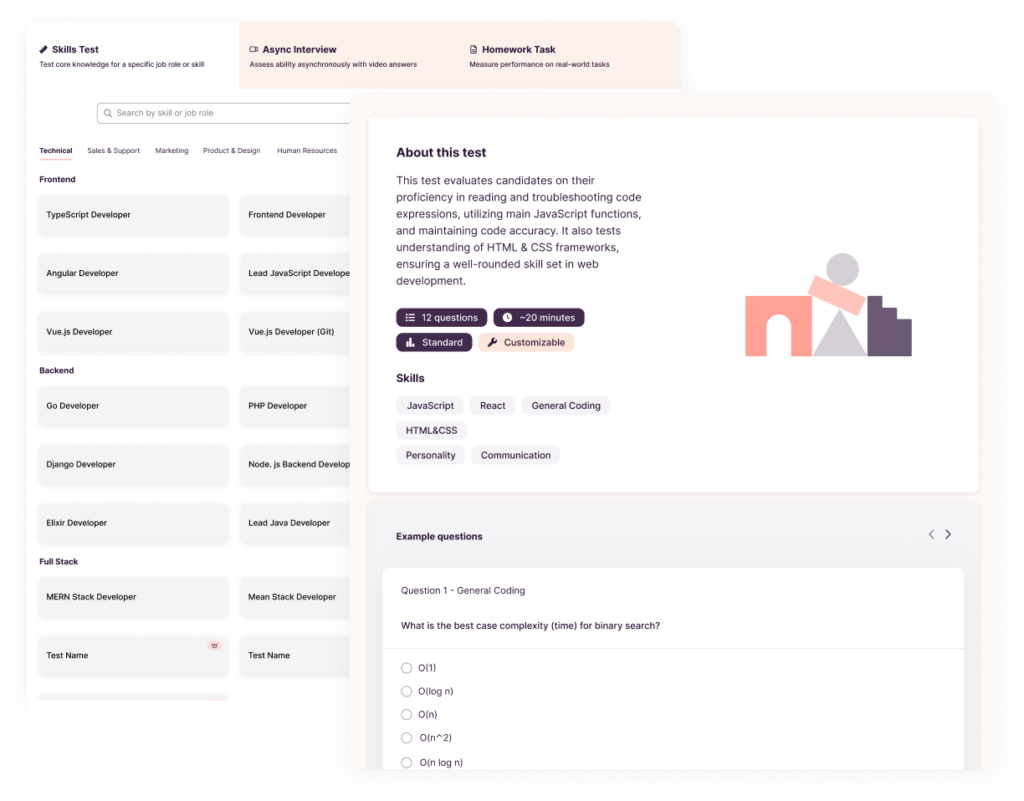
What is job performance?
Job performance is the extent to which an individual contributes to overall organizational success. More specifically, job performance can be split into different components depending on the nature of the role and the managerial framework used.
The most common breakdown of job performance management consists of two interrelated parts.
Task performance: This has to do with the job requirements themselves. Task performance measures the quality of work, technical ability, and productivity of an individual. It is measured by specific outcomes and deliverables that are directly tied to an employee’s responsibilities. It’s about completing tasks in a way that is both efficient and effective.
Contextual performance: This goes beyond the job description. Good examples of contextual performance are coaching coworkers, building and strengthening social networks, and going the extra mile even when it isn’t asked of you. Contextual performance strengthens company culture and contributes directly to the well-being of the organization.
Both are equally important factors to assess when drawing up a job performance analysis.
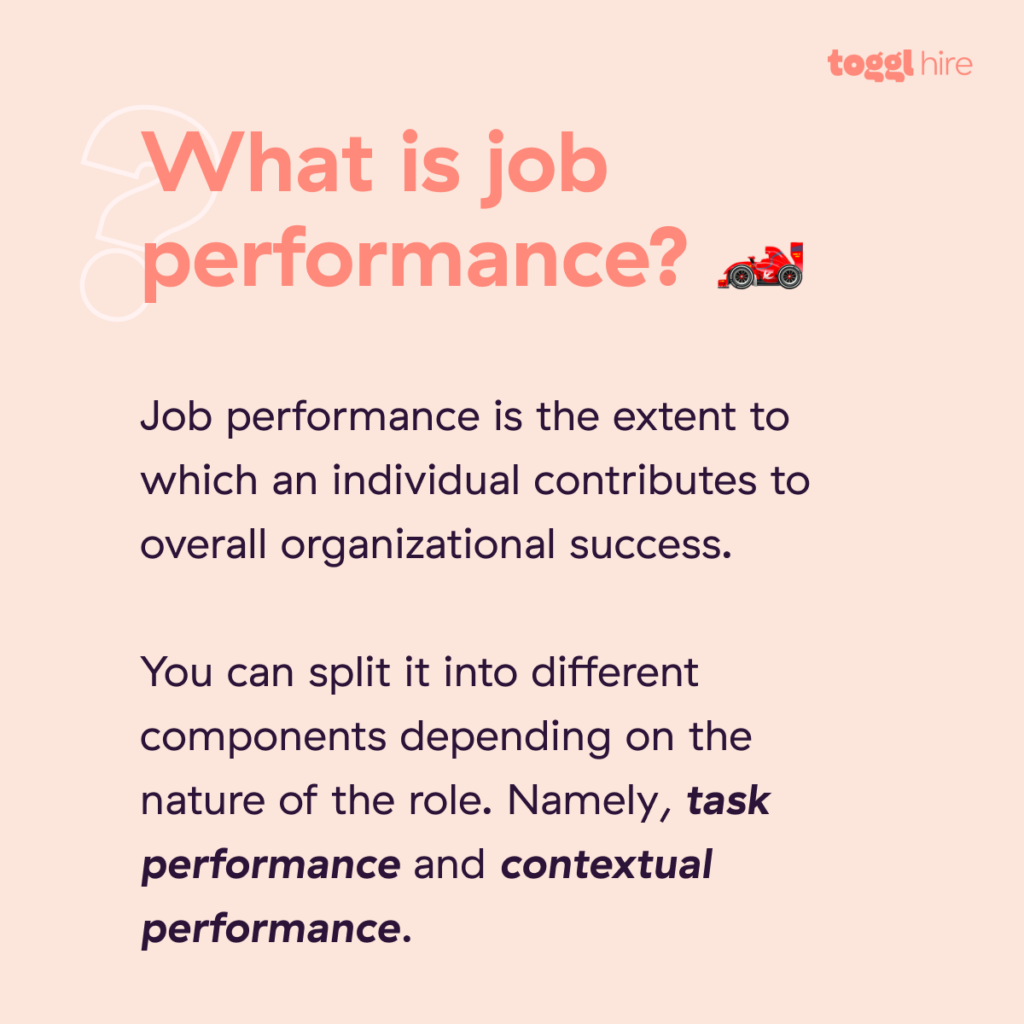
What is employee performance prediction?
Employee performance prediction is exactly what it sounds like. It’s when an employer uses tools and techniques to predict whether a candidate they are looking to hire will perform well in an actual work setting.
This process aims to evaluate every important predictor to select the best candidate for the job—the one who is objectively the most likely to be a top performer in the role, according to criteria set by the job requirements.
Some examples of methods used to predict job performance include:
Or anything else that evaluates job knowledge and simulates tasks that an employee would perform in a specific role.
Businesses often use predictive analytics to predict employee performance in the talent management process. This is the process of using historical data about an employee to predict their future growth trajectory and job performance. For example, information from their performance review, personal development goals, and growth potential can be used to determine whether a candidate is good promotion material.
Is it possible to predict future job performance?
In short, yes. It’s possible to predict if someone is going to meet and exceed your job requirements.
Research has shown that cognitive ability directly impacts job performance, with varying degrees of effectiveness based on the specific job.
Scientists looked at candidates’ cognitive abilities in three jobs related to aviation: flying, navigation, and air battle management. In all three instances, cognitive ability, combined with job-specific knowledge or skill, played a significant role and could be used to predict job performance.
However, to get the most out of an employee performance analysis, you have to know which skills and cognitive abilities are most relevant to the role. The clearer you can get on that, the more reliable your analysis is likely to be.
It’s important to remember that predicting job performance is not an exact science. The process also has limitations.
Sometimes, you can predict that a candidate will perform well in a particular role, but the circumstances in your business (the team, the pace of work, technologies, etc.) simply aren’t conducive to them delivering great work.
Several other factors can lead to inaccurate predictions, such as the quality of your data, the methods employed, and the specific context of the job.
While prediction isn’t foolproof, it can significantly enhance hiring success rates when done correctly. There’s a body of research to support the use of general mental ability (GMA) tests as the cognitive tools with the highest validity and correlation with job performance.
The extensive research underpinning GMA means it can be used with a high level of confidence as a best practice when assessing candidates.
Why can’t traditional recruiting predict future job performance?
While they have been used for decades, candidate screening methods such as resumes, traditional interviews, and reference checks have shown to be pretty poor predictors of job performance.
But let’s go into a bit more detail and examine why that is.
📄 Resumes can be misleading
Resumes are a neat way to highlight all the essential information about a candidate—previous experience, education, professional achievements, and key competencies.
But at the same time, resumes are very unreliable.
Many candidates exaggerate their achievements, hide their flaws, and leave out important information. Even if all the information is accurate, resumes don’t convey any information about the quality of a candidate’s experience.
Research shows cognitive aptitude tests are consistently four times more predictive of success than resumes.
Last but not least, resumes can’t show you crucial soft skills such as problem-solving, communication, and teamwork. Everyone is a team player on paper, but how that will ultimately translate in real life is anyone’s guess.
Limitation: Resumes are self-reported, subjective, and are not verifiable.
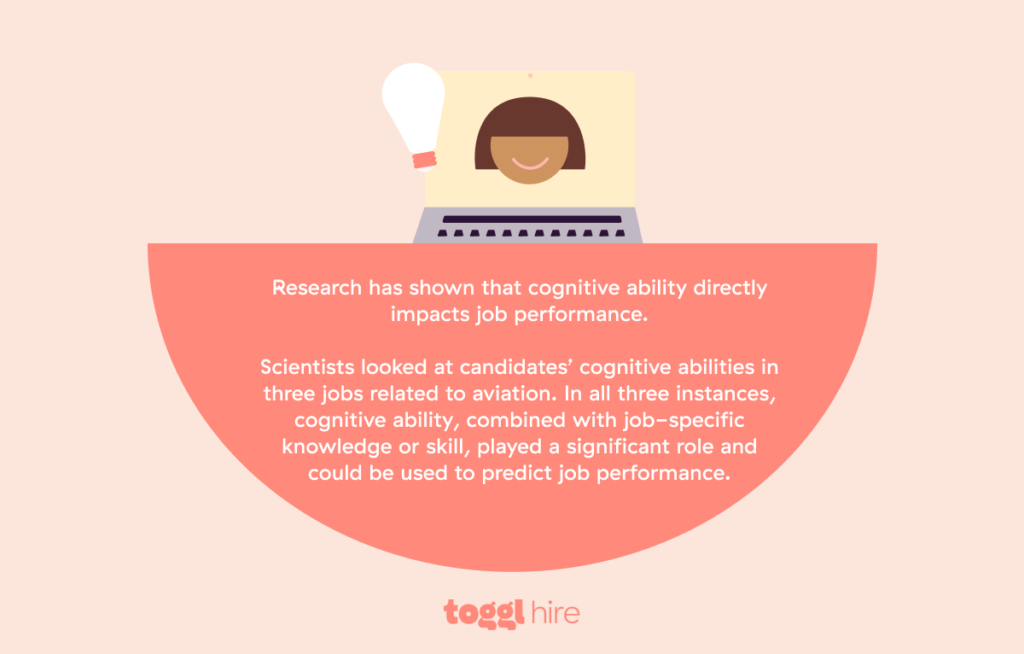
🤐 Interviews don’t predict job performance
There are people who are amazing interviewers but can’t perform well on the job, and vice versa. After all, there are so many factors that could leave a favorable first impression due to bias.
In fact, 48% of HR managers admitted to letting bias affect their hiring decisions. Cognitive biases like similarity bias or the halo effect can lead to interviewers over-relying on first impressions when evaluating candidates.
Additionally, if you don’t standardize and structure the interview beforehand, it will be highly subjective and biased. As a result, some candidates will not be treated fairly, and you will end up with a bad hire.
Limitation: The risk of heavily relying on unconscious biases, which can lead to unfair hiring decisions, is high. This is amplified by unstructured interviews.
🫂 Reference checks may not be reliable
A reference check is a common way to ensure that a candidate’s work experience is legit and that they’re a good fit for the role. But, in reality, it’s also susceptible to bias and, therefore, isn’t an accurate predictor of job performance.
The references you call to check on a candidate could be unwilling to talk negatively about a candidate as they want them to get a new job. Or they could talk badly about them, influenced by a negative personal experience that might not be representative of the candidate.
From the employee perspective, it’s natural they will list references they know will speak favorably about them.
Limitation: References are also at risk of biases, both negative and positive, meaning you’re not getting the full picture of a candidate. They’re also only useful for recent work experiences.
So what is there to do?
By adopting a more comprehensive, data-driven approach to measuring employee performance, you’ll be able to get a holistic view of your candidates’ potential that considers multiple factors.
Toggl Hire’s skills assessment and homework assignments are great ways to do this, as both use relevant, highly targeted tests to show a candidate’s abilities in action.
What are the 10 best predictors of job performance?
So, what actually predicts how well someone can do their job? Based on research, we’ve singled out ten predictors that can provide a reliable indication of future job performance.
1. Cognitive ability
Cognitive abilities refer to mental capabilities like reasoning, problem-solving, and learning—all skills an employee needs to perform everyday tasks. As we’ve discussed, much research shows cognitive ability to be the best predictor of performance in job-related training.
Companies can assess cognitive ability through aptitude, IQ, or other standardized tests. Adding real-world problem scenarios like situational judgment can be a good idea, especially for client-facing roles.
You can test for cognitive ability early on in the screening stage of the selection process. Just use one of many tests in the Toggl Hire test library to find an appropriate test for your use case.

2. Emotional intelligence
Emotional intelligence (EI) is the ability to recognize, understand, and manage one’s own emotions and the emotions of others.
High EI contributes to better teamwork, leadership, conflict resolution, and overall workplace harmony, as employees have better control of their impulses and know how to self-regulate. Research also shows that employees who have emotionally intelligent managers are 4x less likely to quit their jobs.
You can test for high emotional stability and emotional intelligence using a specialized emotional intelligence test, behavioral interview questions, or by introducing role-playing scenarios.
3. Technical, job-specific skills
A traditional recruiting process favors candidates with excellent CV-writing abilities who can talk a big game during interviews. However, these factors have little to no predictive power to foresee great future performance.
The only thing that really matters is whether a candidate possesses the technical skills necessary for the specific role they’re applying for.
You can assess this via skills tests, coding challenges, work samples, or a portfolio. We personally feel there’s no better way to get proof of competence than by seeing it demonstrated in a job simulation.
That’s why we developed skills tests and homework assignments—so you don’t need to start from scratch! Head over to our assessment library and browse all tests by skill or job title.
An added bonus of this method is you can also use it to identify skills gaps and upskill your existing employees, which is vital in a rapidly-changing job market.
4. Growth mindset
A growth mindset is the belief that abilities and intelligence can be developed with effort and persistence. The opposite is a fixed mindset, or the belief that individual talents and shortcomings are inherent and unchangeable.
Candidates with a growth mindset are more likely to embrace challenges, learn from mistakes and criticism, and persist in the face of setbacks. It is linked to greater motivation and increased willingness to attempt new challenges, which ultimately leads to better performance.
Use your interviews to identify candidates with this characteristic. You can do so by asking them about their past experiences with overcoming challenges, learning from failure, and continuous learning.
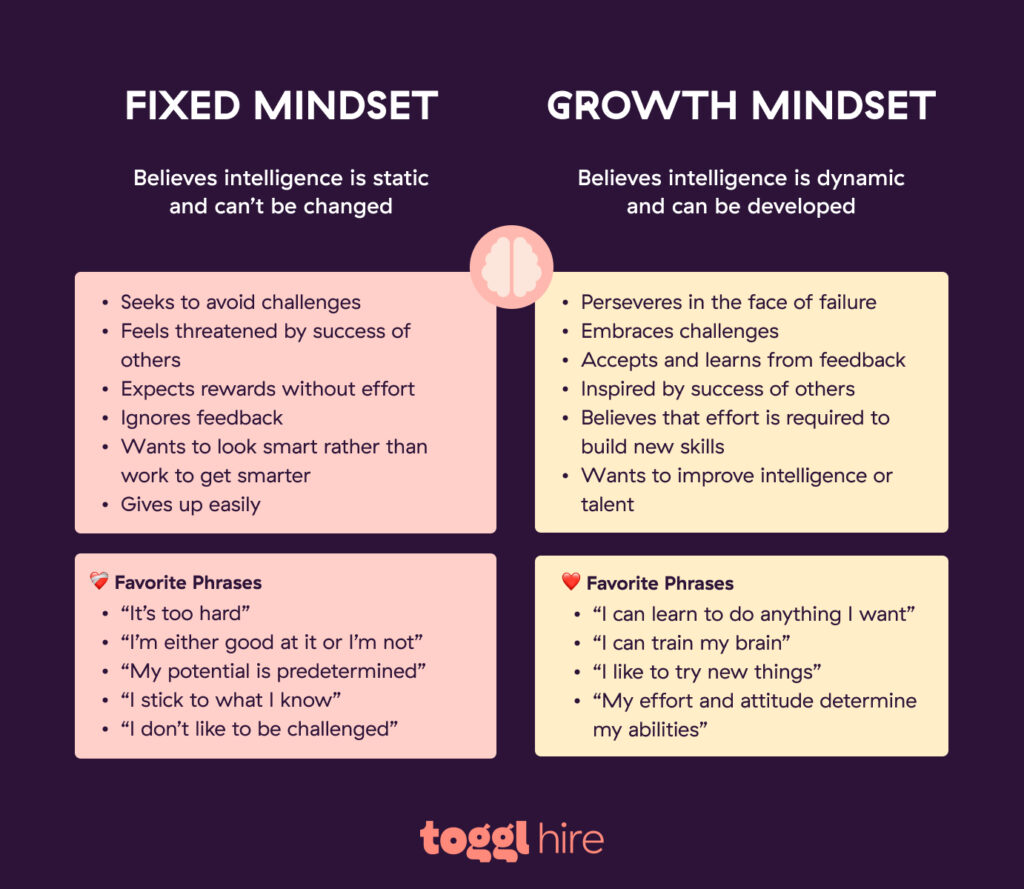
5. Learning agility
Learning agility is the ability to quickly learn new information and apply it to different contexts.
The world is changing rapidly, and if your candidate is unable or unwilling to learn daily, their workplace performance isn’t likely to be stellar. The same goes for modern businesses, where new technologies and strategies are changing faster than ever.
Candidates with high levels of learning agility are five times more likely to stay highly engaged at work. What’s more, organizations with highly agile employees see a 25% increase in their profit margins compared to their competitors.
Learning capacity is a meta skill you can test for at the very beginning of the recruiting process by giving candidates one of Toggl Hire web-based tests. Another approach could be asking them situational judgment questions at the interview or evaluating how they adapted to changes in their previous roles.
6. Adaptability
Adaptability is the capability to adjust to new conditions and remain effective amid change. Adaptability is crucial in a fast-paced and evolving work environment where roles and responsibilities can shift quickly. Adaptability is also a great indicator of leadership qualities and ability.
According to a McKinsey study, employees with high adaptability are 2.5 times more likely to have higher performance and contribute more to the company’s success.
Some key things to ask in an interview to assess adaptability include:
- Curiosity: Ask them how they’d go about building a strategy or solving a problem, but give minimal detail. Then wait and see what kind of and how many clarifying questions they ask to get the information they need to respond.
- Resourcefulness: Tell me about a time you didn’t have all the resources you needed for a project and had to get scrappy. How do you make do with what you have?
- Persistence: Tell me about a time you saw a difficult project through to the end despite unrelenting challenges
- Interpersonal skills: Tell me about a time you had to resolve a conflict within your team OR tell me about a time you handled diverse opinions and how you landed on a decision.
7. Creative problem-solving
Creative problem-solving is the ability to approach problems in innovative and effective ways. It is one of the best predictors of job success, as it contributes to finding efficient solutions, improving processes, and driving innovation.
It can be tested in several ways, such as case studies, hypothetical scenarios, and problem-solving tasks at various points of the hiring process:
Skills test: Use skills assessments from hiring software like Toggl Hire and give the candidate a test for a specific role.
Homework: Once the screening is done, give the candidate a take-home task that they can complete in a few hours.
Scenario test: Place the candidate in a specific imagined scenario and ask them about what they would do. You can also do this during the interview.
Case study: Give the candidate a problem you’re facing in your organization and ask them to provide a solution in a few hours of work.
We highly recommend compensating candidates for their time if you’re hoping to reuse the work they deliver! You should honestly be paying them for their time on homework assignments or other take-home tasks, too, regardless of if you will use the work or not.
8. Motivation
Motivation can be really hard to assess, but when done right, it can tell you a lot about future performance in potential employees. Motivated candidates push themselves and others to do an amazing job and are an asset to any team. They tend to be more engaged, productive, and committed to their work.
Motivation can be either intrinsic (driven by internal rewards like a sense of accomplishment) or extrinsic (driven by external rewards like validation or praise).
You can test for motivation at various stages of the recruitment process:
Resume screening: Review their career progression, past performance, side gigs, and achievements
Interview: Ask about their long-term career vision and what their interests and goals are outside of work
Reference checks: Evaluate how they performed in past jobs and what their peers have to say about their motivation levels
9. Cultural fit
Culture fit is the degree to which a candidate’s values, beliefs, and behaviors align with the organization’s culture. Good cultural fit hires usually lead to higher job satisfaction, better teamwork, and reduced turnover.
While it might seem like an intangible metric, difficult to pin down qualitatively, it is still important to assess and measure.
Some tactics you can use include behavioral and situational interview questions or involving team members in the interview process to get multiple perspectives on how aligned the candidate seems with company values and why.
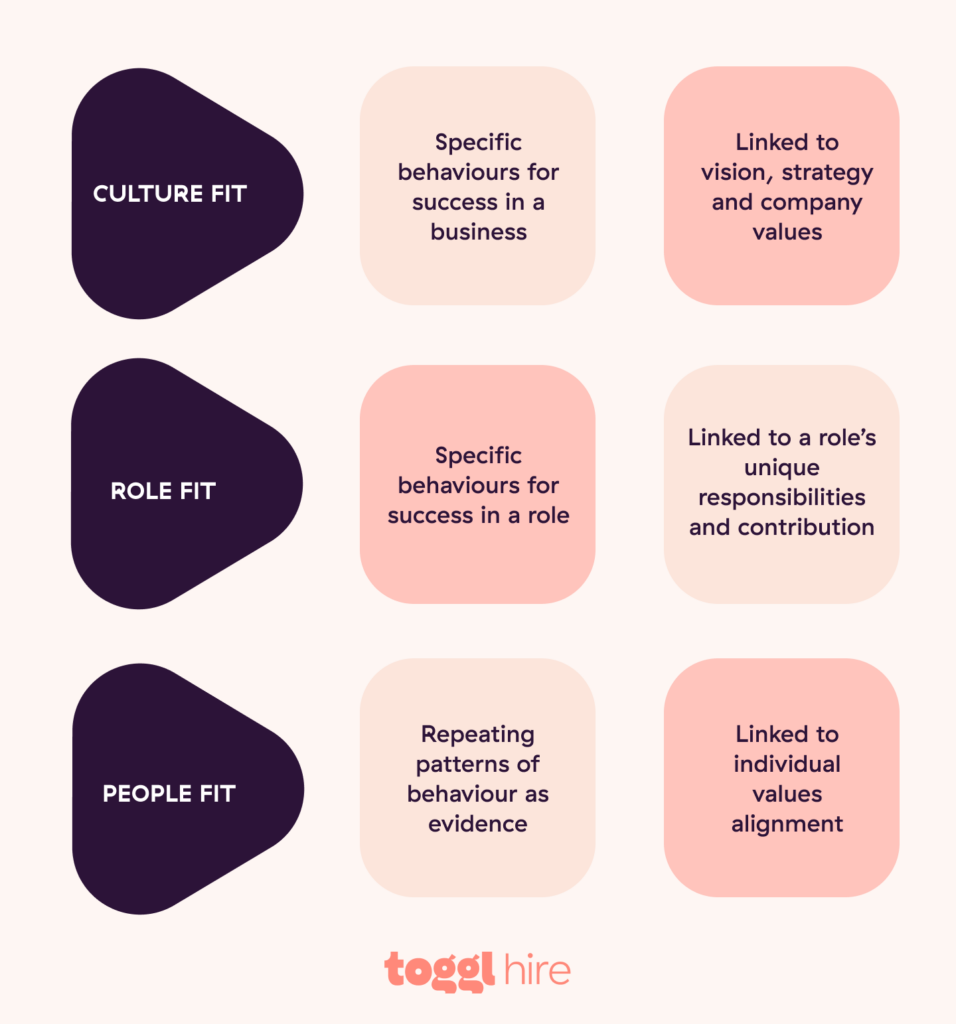
10. Actual track record of success
As simple as it sounds, this is a test of the candidate’s previous work and their success. It is important to evaluate this, as tangible results and great past achievements can be strong indicators of future performance.
You can test for it at any stage of the hiring process, from the initial screening and resume review to the interview and even via references.
In the screening portion of the process, check the specific duties and achievements of the candidate listed for their previous positions. Once they reach the interview stage, ask them for their specific input on a result they mentioned in their track record.
Coming from a marketing background, I’ve seen many cases where candidates showed off amazing projects, stellar conversion rates, and mind-blowing campaigns in leadership roles. Then the interview comes, and it turns out that the candidate had a minor or insignificant role in them.
What are the worst predictors of job performance?
We’ve mentioned some of the best predictors of how well someone performs at work. But what about other predictors that you should stay away from?
1. First impressions and personal factors
Someone’s gender, age, and education level are common ways to get sidetracked in your hiring process.
Your first impression of an individual’s personality or any of these personality traits usually determines how you view the candidate throughout the process, leading to biased decisions in performance management processes.
The problem is that all of these factors rely on the subjective impressions of the person interviewing instead of trying to evaluate specific skill sets that are important for the job at hand.
2. Unstructured interview process
Not just any interviews—unstructured ones. Great HR professionals have a list of questions they stick to in each interview and follow the same process for each candidate.
On the other hand, if you constantly ask open-ended questions and have different processes for each candidate, no two interviews will be the same. As a result, you’re once again relying on your gut instinct and the candidate’s interviewing skills.
3. Academic performance
Top universities and amazing GPA scores are great if you’re running a scholarship program. But this is the real world, where candidates have problems to solve at work, and an A in physics is not a quality to look for in a new hire.
Good school grades may tell you something about a candidate’s motivation and growth mindset, but they certainly won’t predict their job success any more than their personality traits.
4. Brain teasers and trick questions
Here is an example of a brain teaser question from Indeed:
Michelle’s mom has four children. Her first child is named April, her second child is named May, and her third child is named June. What is the name of her fourth child?
Answer: Michelle is the fourth child.
Some hiring managers consider these questions a way to test for essential cognitive ability. In reality, it only shows you if candidates are quick thinkers, which doesn’t correlate with great performance on a job.
You don’t get an overview of their general mental ability or predict future performance—you’re just seeing how quickly they think.
How to measure employee performance
Once you hire a candidate, it’s important you continue to monitor their performance so you can quickly identify any gaps in skills or training, identify areas where they might need extra support, and provide mentorship to boost productivity and performance.
There are various methods you can use to motivate employees and improve employee performance. 👇
Key Performance Indicators (KPIs): KPIs are measurable metrics tied to specific goals. Align individual KPIs with company objectives, and include a mix of short- and long-term goals. Set up standing monthly meetings to assess progress and adjust targets as needed to reflect changes in priorities.
360-Degree Feedback: 360-degree feedback collects performance insights from various sources, such as managers, peers, and even clients. This method relies on total anonymity and internal trust. Use standardized questions to collect insights, and discuss the results with the employee in question. Follow up with actionable plans based on the feedback.
Performance Reviews: Performance evaluations are formal evaluations between employees and their managers. They typically cover performance, achievements, and areas for improvement. Schedule them regularly, set clear expectations with your subordinates, and encourage two-way communication to ensure your employees are getting the support they need from management to hit their goals.
Self-Assessments: Self-assessments allow employees to evaluate their own performance. Provide structured guidelines and use them as a basis for performance discussions and development planning.
Regardless of the method you choose for evaluating employee performance, it’s important to set clear goals and expectations, maintain regular employee feedback loops, and use a mix of qualitative and quantitative metrics to boost morale and productivity.
Predict an employee’s performance with Toggl Hire
Remember the example from the beginning? When comparing an SUV and a sports car for a race, the ultimate way to judge which car would be faster would be to take both for a test drive.
This is what skills testing is all about, and modern recruitment software often includes skills tests as an assessment feature—at least, we do.
With Toggl Hire, you can see how your candidates handle the same tasks and challenges they encounter in their jobs. With customizable assessments, detailed analytics, and a user-friendly interface, our skills-first recruitment software cuts to the core of what matters.
Beyond this, Toggl Hire also offers other full-cycle recruiting features such as applicant tracking, candidate relationship management, and async video interviews. Start predicting your employee performance better and sign up for Toggl Hire today.
Julia Masselos is a remote work expert and digital nomad with 5 years experience as a B2B SaaS writer. She holds two science degrees Edinburgh and Newcastle universities, and loves writing about STEM, productivity, and the future of work. When she's not working, you'll find her out with friends, solo in nature, or hanging out in a coffee shop.


